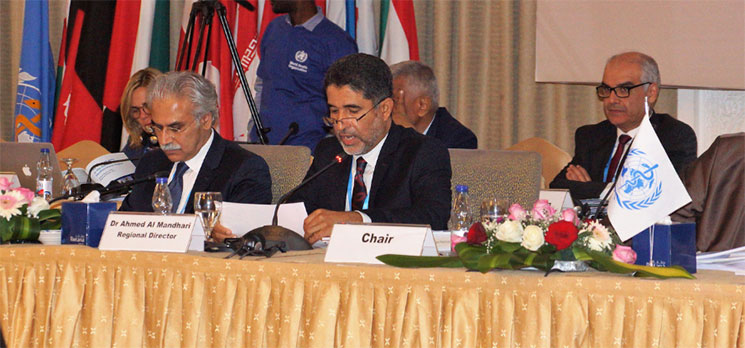
Tuesday, 16 October 2018, Khartoum, Sudan — The 65th Session of WHO’s Regional Committee for the Eastern Mediterranean continued its regular sessions today in Khartoum, Sudan.
HE the Federal Minister of Health in Sudan Professor Mohamed Abu Zaid Mustafa was elected by the members of the Regional Committee as the chair of the 65th Session of the Regional Committee.
Dr Ahmed Al-Mandhari, WHO Regional Director for the Eastern Mediterranean, presented the WHO Regional Director’s Annual Report. He outlined his Health for All by All vision for 20182023 emphasizing its four strategic priorities expanding universal health coverage, addressing health emergencies, promoting healthier populations and making transformative changes to improve the Organization’s ways of working and increase its impact at country level.
Addressing the Regional Committee, WHO’s Director-General Dr Tedros Adhanom Ghebreyesus stated that WHO would continue its work with neutrality and impartiality to ensure that people who were suffering, whether in acute or protracted crises, could access the health care they deserved. He stressed the importance of countries in the Region continuing their progress towards universal health coverage and building strong and resilient health systems able to respond to emergencies.
“We believe that universal health coverage is not just a luxury for countries that enjoy peace, stability and prosperity. It’s a vital line of defence against the impact of emergencies. Strong health systems can mitigate suffering, save lives and provide a buffer against the turmoil and chaos of crisis. Political commitment to universal health coverage, backed up by investments in stronger health systems, are key to the long-term stability, security and prosperity of the Eastern Mediterranean Region”.
A technical paper on advancing universal health coverage in the Eastern Mediterranean Region with a focus on the importance of enhancing data and reliable information systems was presented. Interventions that followed from representatives and heads of delegates reflected the vitality of the subject. Challenges countries of the Region face in progressing towards achieving universal health coverage were highlighted, and experiences were shared.
“Accurate and reliable data is of vital importance for situation assessment. What you cannot assess, you cannot improve. We have seen some experiences in some countries of the Region that showed how monitoring systems play an essential role in preparation and response,” said Dr Ahmed Al-Mandhari.
To mark the 40th anniversary of the Declaration of Alma-Ata on Primary Health Care, a panel discussion was held to review and share experiences and lessons learned on primary health care from across the Region.
At the end of the panel discussion, Dr Ahmed Al-Mandhari launched the joint WHO–World Organization of Family Doctors (WONCA) publication entitled “Family Practice in the Eastern Mediterranean Region: Universal Health Coverage and Quality Primary Care”. The publication highlights challenges and developments in nurturing family practice-based primary health care in the Region.
Another technical paper on promoting health and well-being in the Region noted that there are many successes to celebrate in the Region on the road to improving health, but many challenges still threaten the well-being of the Region’s populations. Noncommunicable diseases are on the rise, and mortality and morbidity rates are very high – the Region has the second highest adolescent mortality rates globally. In addition, the large number of people suffering from anxiety and a regional increase in tobacco consumption rates are also matters of great concern. According to the paper, these concerns are linked to inequalities among the population. The paper concluded that only through intersectoral collaboration and a whole-society, whole-government approach would health and well-being be improved in the Region.
A technical paper on protecting people from the impact of health emergencies was also presented. The paper outlined WHO’s priorities at regional and country level to ensure that populations affected by health emergencies have access to essential life-saving health services and public health interventions; all countries are at reduced risk of high-threat infectious hazards; all countries assess and address critical gaps in preparedness for health emergencies; and national health emergency programmes are supported by a well-resourced and efficient regional WHO health emergencies programme.
Emergencies are a matter of grave concern in the Eastern Mediterranean Region. With more than two thirds of countries in the Region directly or indirectly affected by political conflict, natural disasters and other public health threats, emergencies are high on the agenda at this year’s Regional Committee. In 2017–2018, 10 countries of the Eastern Mediterranean Region were graded emergencies which affected more than 76 million people. As many as 34 million people were either internally displaced or fled to neighbouring countries as a result of emergencies in their own countries.
Participants at the Regional Committee also discussed technical papers on how to improve WHO’s performance and engage with the private sector to further progress towards universal health coverage.


